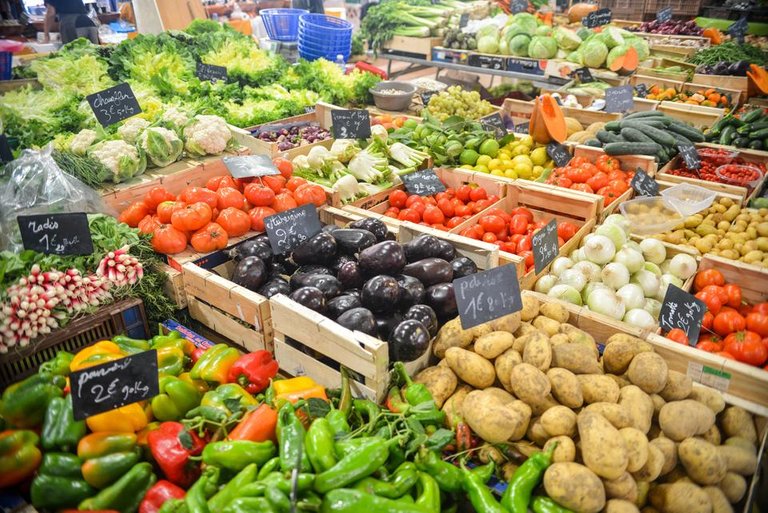More and additional folks have an interest in following eater or vegetarian diets or reducing their use of animal product. A shift off from animal product is obtaining easier with additional fortified and alimental plant-based foods on the market.
A person might attempt a vegetarian diet for health, animal welfare, or non secular reasons. In 2016, the Academy of Nutrition and life science explicit that a eater or vegetarian diet may offer all the organic process needs of adults, children, and people United Nations agency were pregnant or breast-feeding.
Even so, obtaining enough supermolecule and essential vitamins and minerals are often tougher for those that don't eat meat or animal product. someone should arrange ahead to confirm they get enough supermolecule, calcium, iron, and sustenance B-12, which individuals on Associate in Nursing all-devouring diet get from animal product.
Read on for a listing of a number of the most effective plant-based foods for supermolecule. we tend to conjointly discuss the variations between animal and plant proteins, and whether or not plant-based supermolecule powders are often sensible sources of supermolecule.
*Fifteen best plant-based proteins
The right plant-based foods is glorious sources of supermolecule and different nutrients, typically with fewer calories than animal merchandise.
Some plant merchandise, like soy beans and quinoa, ar complete proteins, which implies that they contain all 9 essential amino acids that humans want. Others ar missing a number of these amino acids, therefore uptake a varied diet is vital.
The following healthful, plant-based foods have a high-protein content per serving:
1) Tofu, tempeh, and edamame
Soy merchandise ar among the richest sources of
protein during a plant-based diet. The supermolecule content varies with however the soy is prepared:
firm curd (soybean curds) contains concerning ten g of supermolecule per ½ cup
edamame beans (immature soybeans) contain eight.5 g of supermolecule per ½ cup
tempeh contains concerning fifteen g of supermolecule per ½ cup
Tofu takes on the flavour of the dish it's ready in in order that it is a flexible addition to a meal.
Tofu takes on the flavour of the dish it's ready in in order that it are often a flexible addition to a meal.
People will strive bean curd, as a meat substitute, during a favorite sandwich or soup. bean curd is additionally a well-liked meat substitute in some dishes, like kung pao chicken and sweet and bitter chicken.
These soy product conjointly contain smart levels of metal and iron, that makes them healthful substitutes for farm product.
2) Lentils
Red or inexperienced lentils contain lots of supermolecule, fiber, and key nutrients, together with iron and K.
Cooked lentils contain eight.84 g of supermolecule per ½ cup.
Lentils ar a good supply of supermolecule to feature to a lunch or dinner routine. they will be additional to stews, curries, salads, or rice to convey an additional portion of supermolecule.
3) Chickpeas
Cooked chickpeas ar high in supermolecule, containing around seven.25 g per ½ cup.
Chickpeas may be devoured hot or cold, and ar extremely versatile with lots of recipes accessible on-line. They can, as an example, be additional to stews and curries, or spiced with paprika and roast within the kitchen appliance.
A person will add humous, that is formed from chickpea paste, to a sandwich for a healthful, protein-rich various to butter.
4) Peanuts
Peanuts ar protein-rich, jam-packed with healthful fats, and should improve heart health. They contain around twenty.5 g of supermolecule per ½ cup.
Peanut butter is additionally made in supermolecule, with eight g per tablespoon, creating paste sandwiches a healthful complete supermolecule snack.
5) Almonds
Almonds provide sixteen.5 g of supermolecule per ½ cup. They additionally give an honest quantity of fat-soluble vitamin, that is nice for the skin and eyes.
6) Spirulina
Spirulina is blue or chlorophyte that contain around eight g of supermolecule per a pair of tablespoons. it's additionally made in nutrients, like iron, B aliments — though not vitamin B-12 — and metal.
Spirulina is accessible on-line, as a powder or a supplement. It may be additional to water, smoothies, or drinkable. someone may sprinkle it over dish or snacks to extend their supermolecule content.
7) Quinoa
Quinoa could be a grain with a high-protein content, and could be a complete supermolecule. cooked quinoa contains eight g of supermolecule per cup.
This grain is additionally wealthy in different nutrients, together with metal, iron, fiber, and metal. it's additionally extremely versatile.
Quinoa will fill sure food in soups and stews. It are often besprent on a dish or devoured because the main course.
8) Mycoprotein
Mycoprotein could be a fungus-based supermolecule. Mycoprotein merchandise contain around thirteen g of supermolecule per ½ cup serving.
Products with mycoprotein area unit typically publicized as meat substitutes and area unit out there in forms like "chicken" nuggets or cutlets. However, several of those merchandise contain ingredient, therefore individuals should make sure to visualize the label.
A very tiny variety of individuals area unit allergic to Fusarium venenatum, the plant from that the mycoprotein whole referred to as Quorn is created. individuals with a history of mushroom allergies or with several food allergies may need to contemplate another supermolecule supply.
9) Chia seeds
Seeds area unit low-calorie foods that area unit wealthy in fiber and wholesome polyunsaturated fatty acid fatty acids. Chia seeds area unit an entire supply of supermolecule that contain a pair of g of supermolecule per tablespoon.
Try adding chia seeds to a smoothie, sprinkling them on prime of a plant-based yoghourt, or soaking them in water or almond milk to form a pudding.
Chia seeds area unit accessible from some supermarkets, food stores, or to shop for on-line.
10) Hemp seeds
Similarly to chia seeds, hemp seeds square measure a whole macromolecule. Hemp seeds supply five g of macromolecule per tablespoon. they will be employed in the same thanks to chia seeds. Hemp seeds may be bought on-line.
11) Beans with rice
Separately, rice and beans square measure incomplete macromolecule sources. devoured along, this classic meal will give seven g of macromolecule per cup.
Try rice and beans as a dish, or combine rice, beans, and humous along then unfold on Ezekiel bread, that is formed from up grains, for a savory, protein-packed meal.
12) Potatoes
A large spud offers eight g of macromolecule per serving. Potatoes are high in different nutrients, like metal and vitamin C.
Add a pair of tablespoons of humous for a sapid snack that's healthier than butter-covered potatoes and will increase the macromolecule content. 2 tablespoons of humous contain regarding three g of macromolecule.
13) Protein-rich vegetables
Many dark-colored, bowery greens and vegetables contain macromolecule. devoured alone, these foods don't seem to be enough to satisfy daily macromolecule necessities, however a number of vegetable snacks will increase macromolecule intake, notably once combined with different protein-rich foods.
a single, medium stalk of broccoli contains regarding four g of macromolecule
kale offers a pair of g of macromolecule per cup
5 medium mushrooms supply three g of macromolecule
Try a dish made up of baby greens with some quinoa wet on high for a protein-rich meal.
14) Seitan
Seitan could be a complete macromolecule made up of compounding gluten with numerous spices. The high-wheat content implies that it ought to be avoided by individuals with celiac or protein intolerance. For others, it may be a protein-rich healthful meat substitute.
When cooked in soy, that is wealthy within the aminoalkanoic acid essential amino acid, seitan becomes a whole macromolecule supply providing twenty one g per 1/3 cup.
15) Ezekiel bread
Ezekiel bread could be a nutrient-dense various to ancient bread. it's made up of barley, wheat, lentils, millet, and spelt. Ezekiel bread is a superb alternative for bread lovers United Nations agency need a additional nutrient thanks to eat toast or sandwiches.
Ezekiel bread offers four g of macromolecule per slice. Get even additional macromolecule by browning Ezekiel bread and spreading it with peanut or almond butter.
What concerning supermolecule supplements?
Some supermolecule powders ar plant-based. relying upon the plants accustomed build the powders, they'll be complete or incomplete proteins.
The position of the yank dietetical Association is that whereas food supplements will facilitate individuals meet their daily nutrition goals, feeding a large form of nutrients wealthy in supermolecule is sometimes a higher strategy for meeting daily goals.
Some supermolecule supplements may additionally be high in sugar or metal to enhance the style, therefore it's vital to scan the nutrition labels.
Plant vs. animal supermolecule
The Academy of Nutrition and life science recommends a minimum daily supermolecule intake of zero.8 grams (g) of supermolecule per metric weight unit of weight, or concerning sixty g for someone World Health Organization weighs a hundred sixty five pounds. individuals progressing to build muscle, pregnant or nursing ladies, and older adults may have additional supermolecule.
Animal merchandise like meat, eggs, and milk ar naturally high in supermolecule, that is a necessary nutrient created from amino acids. This makes it easier for those who consume animal merchandise to satisfy their daily supermolecule wants.
The physique creates eleven amino acids however should get another 9 from food. Animal merchandise ar complete proteins, that means they contain all the amino acids. Some plant merchandise, like leguminous plant beans and quinoa, {are also|also ar|are} complete proteins whereas others are incomplete proteins.
A person following a vegetarian or eater diet ought to eat a varied diet of plant-based foods to urge the specified vary of amino acids. This includes high-protein foods, like curd, tempeh, lentils, nuts, seeds, and quinoa.
Benefits and risks of a feeder or vegetarian diet
A diet freed from animal merchandise needs designing and analysis to confirm a personality's organic process wants area unit met. For some, this can be a profit, because it encourages them to suppose their diet and perceive the organic process content of the foods they eat. For others, it will prove difficult and result in organic process deficits.
The Academy of Nutrition and dietary notes that a feeder or vegetarian diet will lower the chance of some diseases, like sure types of cardiovascular disease and cancer, and will promote weight loss.
A study from 2014 checked out the organic process intakes of one,475 individuals and located that folks with a vegetarian diet consumed less saturated fat and fewer dietary sterol than those on omnivorous diets. however they additionally had all-time low supermolecule, calcium, and energy intake scores. nutrition B-12 levels were traditional, presumably as a result of individuals used fortified foods.
The Academy of Nutrition and life science explicit in 2016 that folks on feeder or vegetarian diets area unit at a lower risk of varied sicknesses, including:
ischemic cardiovascular disease
certain cancers
type two polygenic disorder
hypertension
obesity
A study from 2017 watching over seventy,000 ladies found that those with a diet higher in healthful plant-based foods had a lower risk of coronary cardiovascular disease.
A vegetarian diet tends to be low calorie, creating it easier for vegans to manage their weight. as a result of several processed foods don't seem to be vegetarian, a vegetarian diet might preclude several unhealthful, high-sodium prepacked foods.
Another 2017 study found that a vegetarian whole foods diet might considerably cut back inflammation in individuals with arteria coronaria illness. this implies that a vegetarian diet might improve heart health.
Summary
Going vegetarian or eater needs some designing. With the proper protein-based fertilizer, however, people that avoid animal merchandise will eat balanced diets that support a healthy body and scale back the risks of some diseases.
It is vital to debate dietary parts with a doctor or dietician, since vegetarian or eater diets might lack some important nutrients, necessitating the employment of dietary supplements or learning a way to embrace bound foods that ar high in these nutrients.


